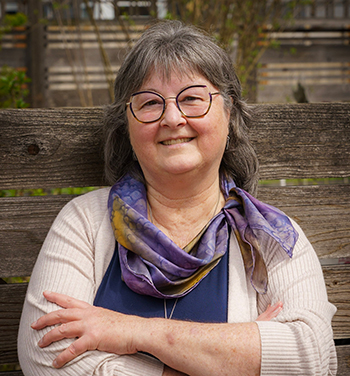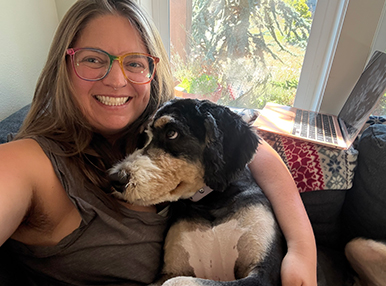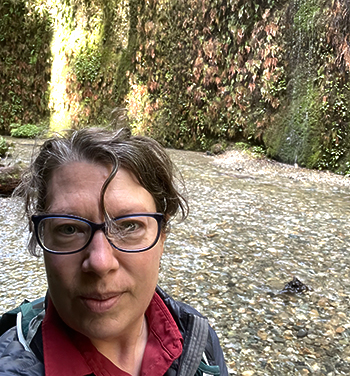Our Team and Our History
OUR TEAM AND OUR HISTORY
The movement for body liberation and fat justice is growing both within public health and in our wider community. Please join us!
Project Creator: Debbie Kaufman
In 2025, I retired after 18 years of teaching at Portland State University and the OHSU-PSU School of Public Health. I taught courses that covered a variety of topics, such as: drug education, addiction, and treatment; marketing public health; stress management; and, starting in 2019, Body Liberation for Health.
Since 2016, I have immersed myself in the field of Fat Studies, the work of The Center for Body Trust® and the body liberation movement more generally. In 2018, I completed the training to become a Certified Body Trust® Provider. This has been both a professional and very personal journey for me. Professionally, my work has been focused on exploring the intersection between body liberation and public health.
As with any anti-oppression and social justice effort, this journey has also involved both challenging and liberating personal work. I have many privileged identities, including being white, middle-class, relatively well-educated, born in the U.S., cis-gender and currently, mostly able-bodied. I am also a woman and have a small- to mid-size fat body. I grew up with thin privilege, but that changed as I entered perimenopause. So, much of my personal Body Trust® work has been done at the intersection of weight and ageing.

COLLABORATORS
KATIE BOROFKA, MPH, LCSW, CST
I am an Adjunct Instructor for the OHSU-PSU School of Public Health, and teach Human Sexuality, in addition to Women’s Reproductive Health and Maternal & Child Health. Starting in 2026, I will add Body Liberation for Health to my teaching schedule. For several years I have been infusing weight neutral readings and research into my classes, asking students to deconstruct normative ideas about weight and health. I am primarily a Certified Sex Therapist and Certified Body Trust Provider®, working both at Quest Center for Integrative Health and in private practice, where I focus on serving folks, many of whom are queer and/or trans, who are interested in pursuing healing of gender and sexual based trauma. Many of my clients are working at the intersection of sexuality, eating, movement, and embodiment and I am excited by and passionate about this work.
As a white, cis, able bodied, straight sized, US born, middle class, and queer person, I strive to approach all issues, whether in the classroom or in the therapy office, from a place of humility, curiosity, and compassion. My personal journey of navigating disordered eating, compulsive exercise, and mental health has deeply informed my professional work. I am excited to contribute further to the Body Liberation + Public Health project. In my free time, you can find me with my wife, puppy, cats, and a garden that is too large for us to manage.

STASHA HORNBECK, MS, RDN, LDN, CDCES
I have been an outpatient dietitian and diabetes educator, working in the field of diabetes and eating disorder recovery, since 2005. After many years of witnessing the conflict and shame in the patients I worked with, who always wanted to control their weight and body size, I started training with the Center for Body Trust and became a Certified Body Trust Provider® in 2022. I now work from a weight and size inclusive care paradigm, using trauma-informed, and harm reduction approaches, to help me, and the people I work with, heal relationships with food and the body. Within the healthcare system I work in, I also educate clinicians and patients to challenge anti-fat bias and promote inclusive healthcare.
As a cis, hetero, white, neurotypical woman, I’ve bumped up against a lot as I’ve worked to identify and dismantle my own anti-fat bias, complicity with diet and fitness culture, and the thin preference that my family of origin believed in. Today, I’m raising two amazing kids who remind me daily what intuitive eating and a non-binary world can look like. Recently, I’ve been reclaiming joyful movement, coached by weight and size inclusive teachers. I love dogs, old growth forests, waterfalls, and volcanoes. Not a fan of the strings in celery, snakes, early mornings, and mean people.

EVOLUTION OF THIS PROJECT
The seeds of this project began in the spring of 2018 when Debbie and a group of School of Public Health undergraduates created a book discussion group for “The Fat Studies Reader” (2009; Edited by Rothblum and Solovay). Students from that group were the first to advocate for a Fat Studies course in the School, and Body Liberation for Health is now a permanent course in the undergraduate program. This was all possible due to student advocacy, along with faculty and administrative support.
In 2023, as Debbie was approaching retirement, she was motivated to create a resource specifically at the intersection of body liberation and public health. With the help and inspiration of friends, colleagues and other fat activists, this website was created. It has grown slowly and deliberately, including several others sharing their work and insights through their own articles. In 2025, Stasha and Katie, who have contributed multiple articles, agreed to take on more active roles in writing and editing.
MISSION
It is our intention that the information, resources, and stories provided here will expand the public health community’s commitment to equity and inclusion for people in all body sizes.
MEDIA & PRESS COVERAGE
- Think Out Loud, The Oregon-project pushing for body liberation, January 23, 2026
- Portland Monthly, The Public Health Educators Changing How We Think About Fat, January 6, 2026, Brooke Jackson-Glidden
A NOTE OF GRATITUDE
I have so much appreciation for John Fitzgerald, Erin Fitzgerald and Nancy Caldwell for their encouragement, many resources and hard work to bring this project to fruition; and gratitude overflowing to John for 15+ years of challenging and enlightening conversations, the sharing of his knowledge, collegiality and friendship. Thank you. — Debbie
Reducing weight stigma in our curriculum and using a weight-inclusive approach are critical to our expanding focus on equity in our School. We must be willing to do our personal work to unpack our own biases about weight, so that both what we teach and how we teach have a liberatory focus.”
—Belinda Zeidler, MST, Assistant Professor, OHSU-PSU School of Public Health